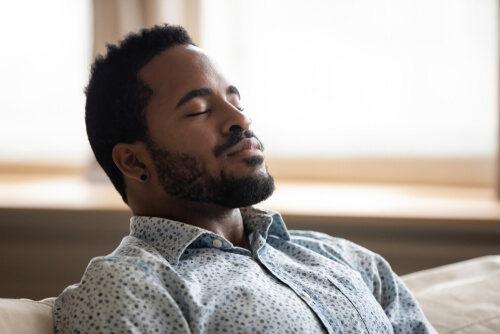For some people, being alone can be a source of joy and contentment. They engage in solitary activities they are passionate about, contemplate life, and reach out to others when they feel the need for connection and companionship.
Some individuals, on the other hand, feel uneasy and afraid when they are alone. In fact, the fear of being alone is quite a widespread phenomenon. People who are afraid of being alone can experience severe anxiety when on their own and feel like they need other people around them in order to feel safe.
In some cases, the fear of being alone may be linked to attachment issues that activate what the behavioral health industry often calls love addiction, caused by childhood neglect or trauma. The fear may also develop as a result of other anxiety disorders or actual negative experiences when alone.
Keep reading to learn more about the fear of being alone and learn what you can do to overcome it.
What Is The Fear Of Being Alone?

The fear of being alone, also known as autophobia or monophobia, tends to entail feelings of anxiety and uneasiness in solitude. If you suffer from autophobia, you may feel a strong urge to have another person beside you in order to feel safe in your own home. You may keep the TV on at all times, have long phone conversations throughout the day just to avoid being alone with your thoughts, or spend time with people you don’t actually like.
Autophobia is not a rational fear – the person may understand that they are physically safe, but still experience anxiety and fear of:
- Strangers and burglars
- Feeling unwanted or unloved
- Experiencing sudden medical issues
- Hearing strange, unexpected noises
Symptoms Of Autophobia
If you have a chronic fear of being alone, you may experience a wide range of psychological and physical symptoms when alone or faced with a possibility of ending up alone. Some common symptoms include:
- Obsessive worry about being on your own
- Intense fear of bad things that could happen to you while being alone
- Feelings of detachment from your body in solitude
- Experiencing sweating, chest pains, shaking, dizziness, nausea, or hyperventilation when alone
- Extreme panic when a relationship ends – even one that is not healthy
- Overwhelming urge to flee when you’re alone
- Anticipatory anxiety symptoms when faced with the possibility of ending up alone
The fear of being alone can cause a person to go to extreme lengths in order to avoid solitude. They may not want other people to leave, often at the cost of appearing clingy or needy. In general, individuals with autophobia tend to lack independence in their relationships.
Is It Normal To Hate Being Alone?
Humans are social creatures, which means that we often prefer to share our time and experiences with others instead of being alone. It is perfectly normal to feel lonely when you feel like you don’t have enough meaningful social connections. However, if you experience severe anxiety when alone or at the thought of ending up alone, you may be struggling with autophobia in which case reaching out to a professional may be the best course of action.
What Triggers Autophobia?
An individual experiencing autophobia may become anxious at the mere thought of ending up alone. Although an actual threat to their wellbeing may not exist, the individual might still struggle to control their symptoms.
While it’s not always clear what leads to autophobia, here are some possible causes:
Like many other phobias, the fear of being alone often develops in childhood. You may not be aware of the specific source of your fear; you might have experienced an event that resulted in a fear of abandonment, such as a death in your family, neglect, or a parental divorce.
Some people develop autophobia after a traumatic experience that happened when they were alone. If the traumatic memories aren’t properly integrated, the person may experience intense fear when faced with a situation that reminds them of the event.
The fear of being alone can also come as a result of other psychological conditions, such as generalized anxiety disorder, agoraphobia, or PTSD. For example, if you tend to experience panic attacks, you may fear being alone with no one around to help you.
How Do I Get Over My Fear Of Being Alone?
Overcoming your deepest fears can be a challenging experience. If you fear being alone, you may find solace in the following strategies:
- Mindfulness exercises, meditation, and aromatherapy can help lower your anxiety levels and help you self-regulate. By learning to be present in your environment, you will find it easier to ward off anxiety symptoms and calm yourself down.
- For some people, having a steady routine can reduce anxiety symptoms. This may entail maintaining a consistent sleep schedule, eating a healthy diet, and engaging in housework on a regular basis.
- If you notice that your fear is impacting your relationships and other areas of life, you may want to try distracting yourself with background noises. Listening to music, watching TV, or using your phone or tablet can give you something to focus on.
- The previous step, while useful, won’t help you address the underlying cause of the fear. Consider reaching out to professionals online or in person or seeking support from friends and family.
Face Your Fears Through Expert Codependency Recovery Coaching

Living life in fear can prevent you from achieving your goals and establishing meaningful, fulfilling relationships. PIVOT is here to help you heal your core wounds and overcome insecurities in a compassionate, holistic manner. With years of experience helping couples and individuals, our team is fully committed to providing our clients with reliable and tailored support.
You can find the support you deserve through our personalized and insightful individual coaching or in one of our transformative relationship-building retreats and workshops. No matter which option you choose, you can expect our PIVOT advocates to provide you with expertise-based advice that helps you change the course of your life. Contact us today and start your journey to happiness and well-being.

